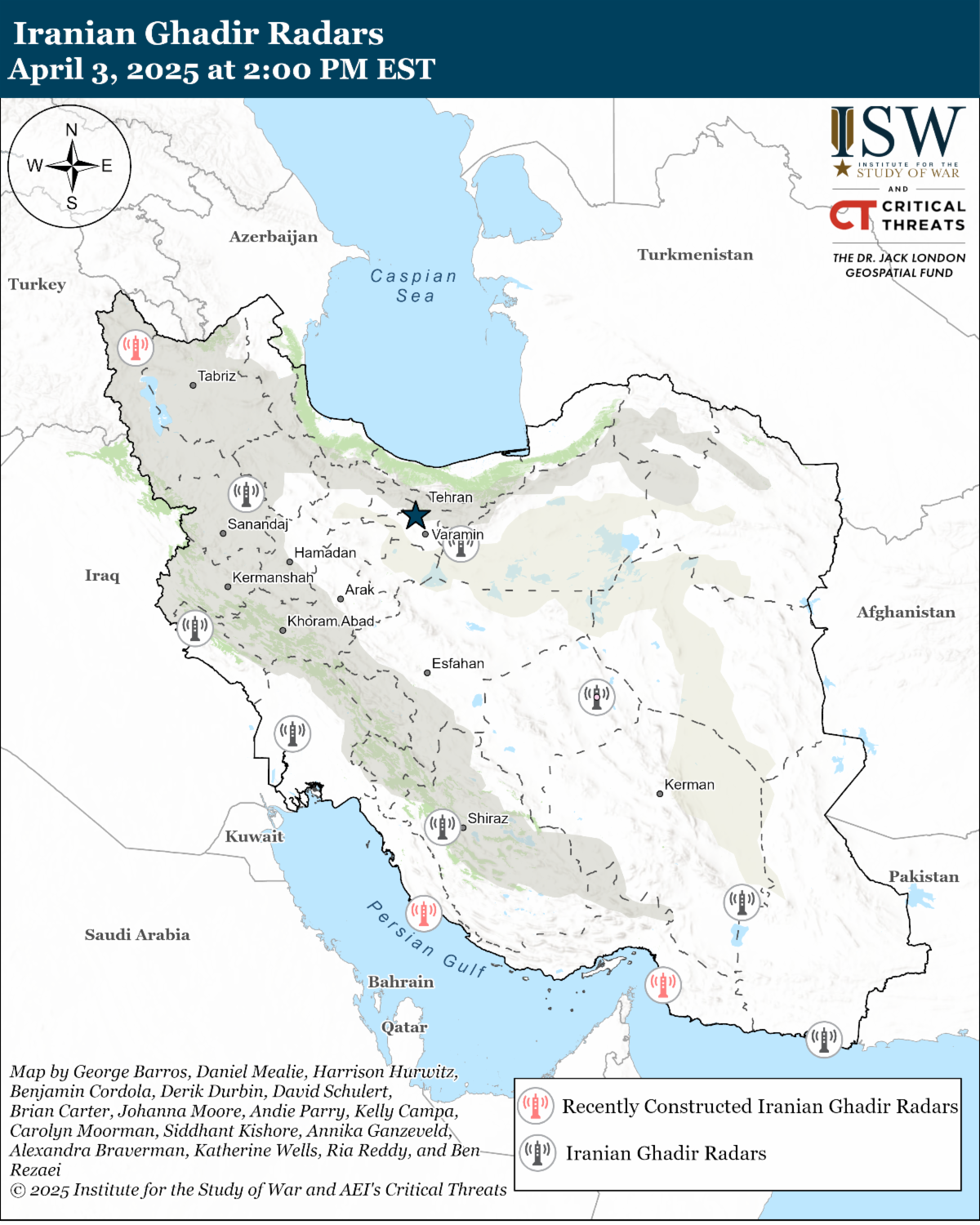Iran is continuing to try to bolster its air defenses in preparation for a potential US or Israeli strike on Iran. Iran has built a new Ghadir phased-array radar in West Azerbaijan Province in northwestern Iran in recent months, according to commercially available satellite imagery. An open-source analyst reported on April 2 that Iran also recently built two Ghadir radars in southern Iran near the Persian Gulf and the Strait of Hormuz. The October 2024 Israel Defense Forces (IDF) strikes on Iran damaged two Ghadir radars in southwestern Iran. The operational status of these radars is unclear. Iran has conducted several air defense exercises in recent months, particularly around Iranian nuclear facilities. The construction of new radars and recent exercises reflect Iran's efforts to strengthen its air defense capabilities amid the Iranian regime’s concerns about a potential conventional conflict with the United States or Israel.
Russia remains an unviable mediator between the United States and Iran given Russian support for the Iranian nuclear program and Axis of Resistance activity in the Middle East. Russian Deputy Foreign Minister Sergei Ryabkov stated on April 1 that Russia is willing to mediate talks between Iran and the United States about the Iranian nuclear program. Iranian Deputy Foreign Affairs Minister for Political Affairs Majid Takht Ravanchi, who serves as the chief Iranian nuclear negotiator, met with Ryabkov in Moscow on April 2 to discuss Iranian nuclear negotiations. Ravanchi and Ryabkov emphasized the importance of "resolving misunderstandings about the peaceful nature of Iran's nuclear activities." A senior Russian official similarly downplayed the threat of the Iranian nuclear program in early March 2025, claiming that Iran's production of 60 percent enriched uranium has "no weapons risk." Iran currently has enough 60 percent enriched uranium, if enriched further, to produce six nuclear weapons. Senior Russian officials have also previously criticized the US "maximum pressure" campaign against Iran and called US threats to strike Iranian nuclear facilities "unacceptable.”
Russia has also supported the Axis of Resistance against Israel and the United States. Russia has provided the Houthis with targeting data to support Houthi attacks on commercial shipping and US vessels in the Red Sea, according to Western media. The Telegraph reported on April 3 that there is currently a Russian military expert in Yemen who is advising the Houthis on how to conduct attacks.” Russian support for the Iranian nuclear program and Axis of Resistance activities in the region make it extremely unlikely that Russia would be able to help the United States secure its interests in the Middle East.
Key Takeaways:
- Iranian Air Defenses: Iran is continuing to try to bolster its air defenses in preparation for a potential US or Israeli strike on Iran. Iran has built a new Ghadir phased-array radar in West Azerbaijan Province in northwestern Iran in recent months, according to commercially available satellite imagery. Iran has conducted several air defense exercises in recent months, particularly around Iranian nuclear facilities. The construction of new radars and recent exercises reflect Iran's efforts to strengthen its air defense capabilities amid the Iranian regime’s concerns about a potential conventional conflict with the United States or Israel.
- Russo-Iranian Cooperation: Russia remains an unviable mediator between the United States and Iran given Russian support for the Iranian nuclear program and Axis of Resistance activity in the Middle East. Russian Deputy Foreign Minister Sergei Ryabkov stated on April 1 that Russia is willing to mediate talks between Iran and the United States about the Iranian nuclear program. Iranian Deputy Foreign Affairs Minister for Political Affairs Majid Takht Ravanchi, who serves as the chief Iranian nuclear negotiator, met with Ryabkov in Moscow on April 2 to discuss Iranian nuclear negotiations. Russian support for the Iranian nuclear program and Axis of Resistance activities in the region make it extremely unlikely that Russia would be able to help the United States secure its interests in the Middle East.
- Iranian Support for the Houthis: A senior Iranian military official told The Telegraph on April 3 that Iran is “abandoning” the Houthis. This statement is very likely part of an Iranian information operation to try to obfuscate Iran’s leading role in the Axis of Resistance and absolve Iran of responsibility for proxy attacks against the United States and Israel. The Houthis’ ability to disrupt international trade and attack Israel makes them a strategic and valuable partner for Iran, which Iran is unlikely to abandon.
- Israeli Activity in Syria: The IDF engaged armed Syrians during an Israeli incursion 13 kilometers into Syrian territory near Nawa, Daraa Province, on April 2. This incident marks the second time that Syrians have attacked Israeli forces advancing into southern Syrian territory since the IDF killed at least four armed Syrians in Kuwaya, Daraa Province, on March 25. This incident may present anti-Israel and anti-interim government armed groups with an opportunity to gain support and recruit new fighters.
- Israeli Activity in Syria: The IDF has continued to strike military assets in Syria, including a site where Turkey reportedly seeks to establish an airbase. The IDF struck Hama Military Airport in Hama Province, Tiyas Airbase in the central Syrian desert, and the Syrian Scientific Studies and Research Center (SSRC) in Barzeh, Damascus, on April 2. Unspecified Israeli sources told Israeli media on April 2 that the IDF conducted the strikes to send a message to Turkey that Israel will not allow Turkey to establish military bases in Syria.
| 




 [국방부] 제57주년 국방부 예비군의 날 축하행사 개최
[국방부] 제57주년 국방부 예비군의 날 축하행사 개최
 [ISW] 러시아의 공세 캠페인 평가, 2025년 4월 3일
[ISW] 러시아의 공세 캠페인 평가, 2025년 4월 3일